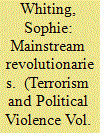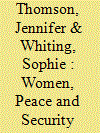|
|
|
Sort Order |
|
|
|
Items / Page
|
|
|
|
|
|
|
| Srl | Item |
| 1 |
ID:
148915


|
|
|
|
|
| Summary/Abstract |
Despite the seismic shift of Sinn Féin from being the “mouthpiece” of the Provisional Irish Republican Army to the largest nationalist force in Northern Ireland, the party continues to project its objectives within the revolutionary politics and tradition of 1916. Whilst various groups across the island of Ireland stress their loyalty to Irish independence and allegiance to their republican forefathers, 2016 also plays host to devolved assembly elections in Northern Ireland. The centenary of the Easter Rising is therefore a poignant moment to reassess republican politics, more specifically, the relationship between the armed revolutionary tradition and constitutionalism. Within the post-peace process era Sinn Féin have been accused of maintaining an autocratic culture and an intra-party framework that is more representative of a clandestine revolutionary organisation than a political party. Yet, simultaneously, Sinn Féin have not been immune to the pressures experienced by other modern political parties, bound by the laws of electoral competition and driven by office-seeking priorities. In order to explore Sinn Féin within the modern political arena, this article firstly examines the broader debate surrounding how armed groups make the transition into constitutional politics. Secondly, public opinion survey data is used to judge the basis of Sinn Féin's electoral appeal. Finally, internal party documents are used to examine party structure, intra-party democracy, and professionalisation in order to judge the extent to which Sinn Féin have completed the transition from being a “mouthpiece” to their armed counterpart, towards being a “normal” political party.
|
|
|
|
|
|
|
|
|
|
|
|
|
|
|
|
| 2 |
ID:
187150


|
|
|
|
|
| Summary/Abstract |
In recent years, Brazil and Poland have elected governments that are sceptical of both the liberal international order and gender. In both cases, contemporary administrations have bolstered the pre-existing anti-gender offensive of religious and secular conservative forces and converted this into legislation and public policy. Yet, at the same time, both have also created National Action Plans around the UN's Women, Peace and Security agenda. Why is this the case? Why do two governments that see gender as an ‘ideology’ continue to work on WPS? Using a feminist institutionalist framework, this article draws on content analysis of the NAPs and semi-structured in-depth interviews with stakeholders in Brazil and Poland to explore this puzzle. We argue that the WPS agenda has survived in these political contexts due the presence of key ‘femocrats’ within the state; the influence of international institutions; and the symbolic power that the WPS agenda gives to these countries on the world stage. As such, the article makes a key contribution to the literature on the WPS agenda and also bolsters the argument for a complication of the idea of gender ‘backlash’ – in domestic and international audiences, states are willing to adopt different attitudes to gender if it furthers their interests.
|
|
|
|
|
|
|
|
|
|
|
|
|
|
|
|
|
|
|
|
|